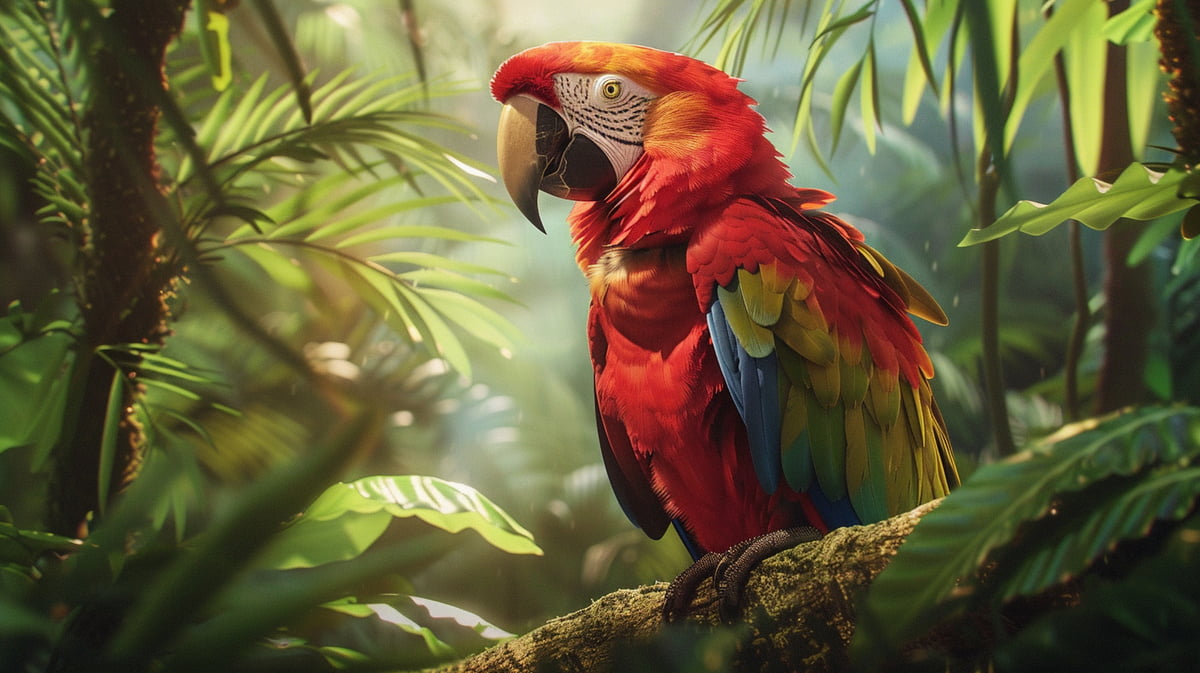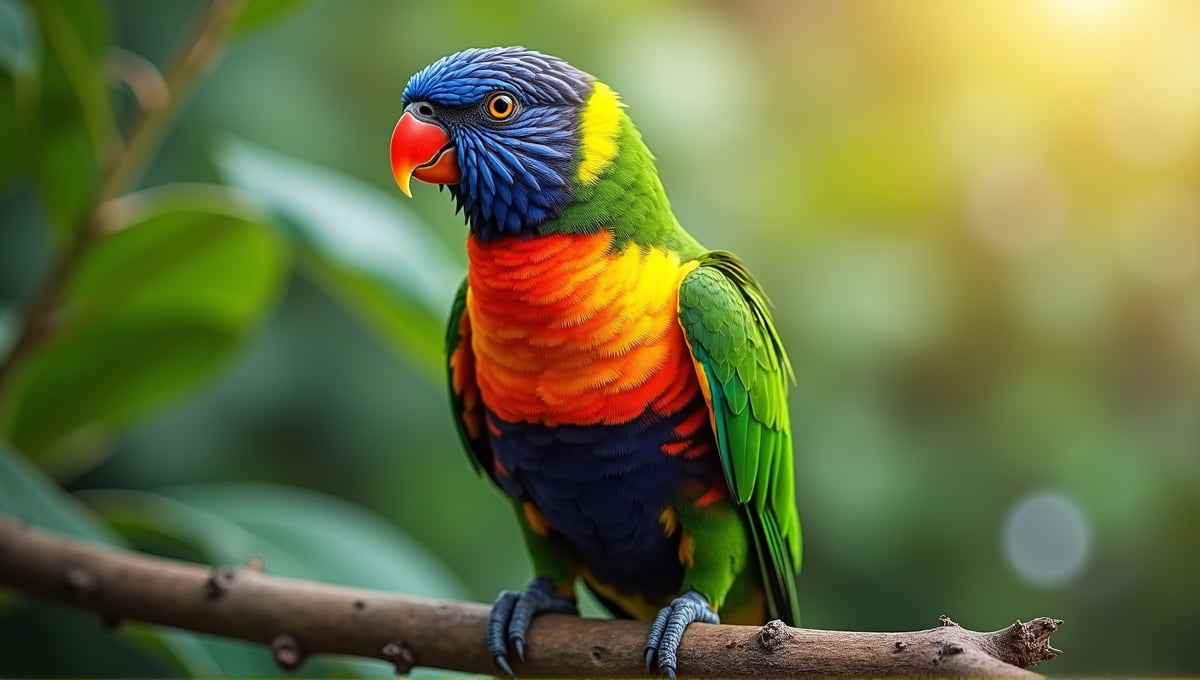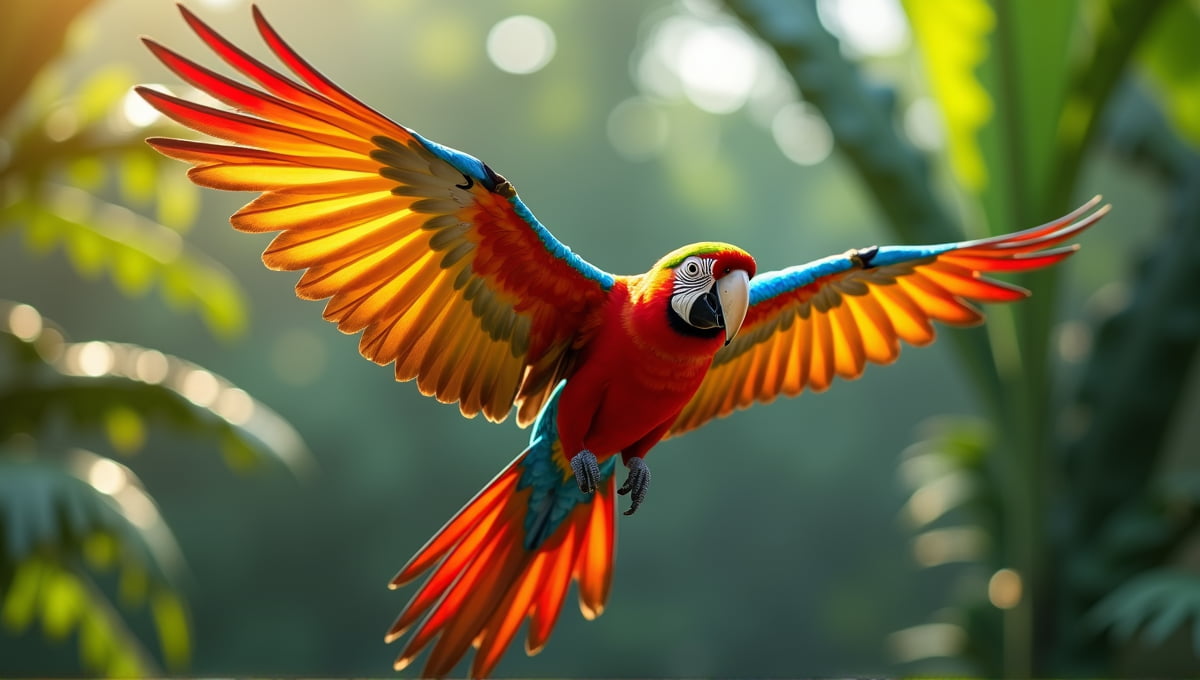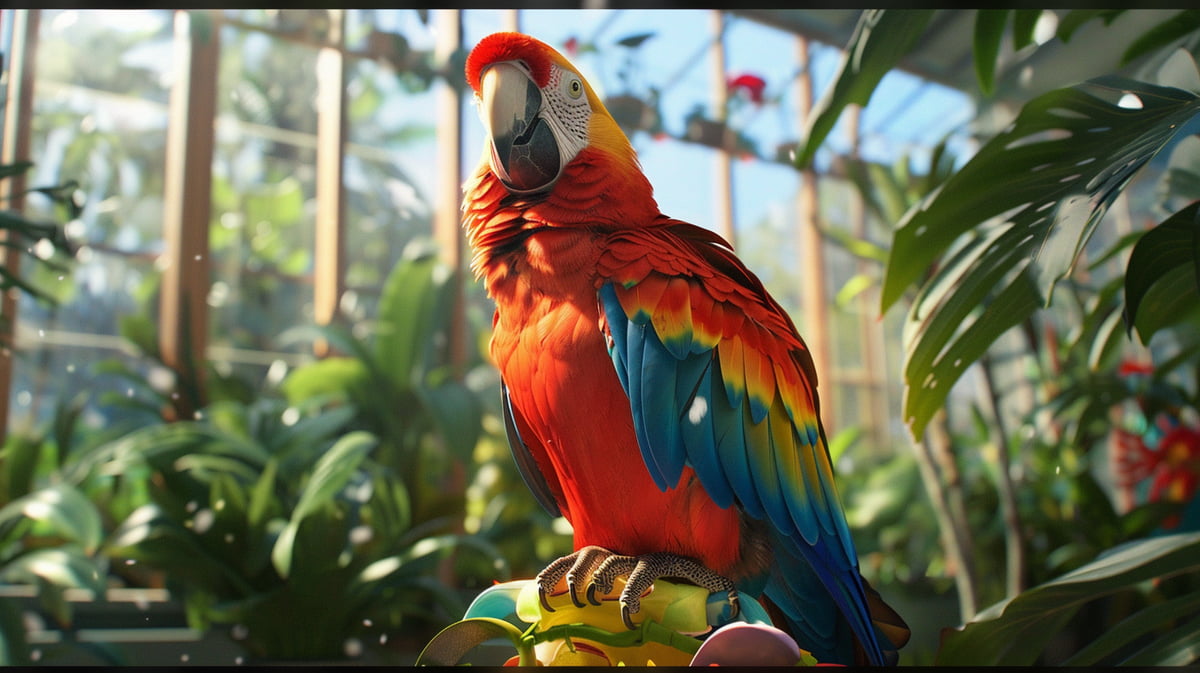As someone who has studied exotic birds in the wild and in domestic environments as an avian ecologist expert, I have a lot of experience with exotic birds. Exotic pet birds are intriguing pets, but they’re not the best choice for everyone. So are exotic pet birds the right option for your home? Let’s discuss exotic pet birds and whether they might be a good fit for your family.
Popular Exotic Pet Bird Species

Exotic pet birds are beloved for their beautiful colors and charming personalities. I’ve personally worked with many species over the years and can provide some insights into a few popular options.
Macaws are a favorite species thanks to their large size and colorful, rainbow-like feathers. These birds are highly intelligent and are available in different species like Blue and Gold Scarlet, and Hyacinth macaws. They have an impressive wingspan that can measure up to 60 inches.
African Grey Parrots are well known for their exceptional intelligence and talking ability. These birds can learn a vocabulary of 1,000 words or more. I’ve witnessed their impressive ability to mimic human speech and even understand the context of a conversation. If you’re interested in pet birds that talk, African Grey Parrots are an excellent choice.
Eclectus Parrots are interesting because of their sexual dimorphism. Males are a bright green color, while females have beautiful red and blue feathers. In my experience, male Eclectus parrots are usually calmer and less aggressive than females.
Toucans are easily recognizable due to their large, colorful beaks. These birds primarily eat fruit, so they require a specialized diet and plenty of space to be happy in captivity. Their unique appearance makes them a top choice for people seeking an exotic bird.
Caiques are small parrots that are famous for their playful demeanor. These energetic birds also have a unique habit of rolling onto their backs while playing. Their acrobatic behavior is always entertaining for their owners.
Pionus Parrots are a great option for someone who wants a parrot without the excessive noise. These medium-sized birds make quieter vocalizations than many other parrot species. They also have a gentle demeanor, making them a good option if you live in an apartment or have roommates.
Housing Requirements for Exotic Pet Birds
Proper housing is essential for the health and well-being of your exotic pet bird. All bird species have specific housing requirements that you must meet to keep them healthy.
The size of the cage is one of the most important considerations. Larger species, such as macaws, need larger cages. A minimum macaw cage size is 3 feet long x 2 feet wide x 4 feet high. Small birds pets can thrive in smaller cages, but always choose the largest cage that you have space for.
Birds also need space to stretch their wings and move around, so the cage should be large enough that they can fly at least a little bit, even if it’s just a small distance. This is important for their physical and mental health.
The cage should also contain perches made of different materials and of various diameters, toys, and food and water dishes. Different perch materials help to exercise their feet, while pet bird toys provide mental stimulation and prevent boredom.
You should also have bird-safe space outside the cage where the bird can play under supervision. Before each play session, scan the room for anything dangerous, such as toxic plants or exposed cords. This enables your bird to explore and provides you an opportunity to interact with it in a confined space.
It’s important to control the temperature and humidity in the bird’s swarming. Most parrots are comfortable in temperatures of 65–80 degrees Fahrenheit. Additionally, keeping the humidity anywhere from 50–70% helps keep their respiratory system healthy.
Always remember that the cage is where the bird lives, so make it a comfortable and interesting place for them. And cleaning the cage and keeping up with basic maintenance should help keep your bird healthy and happy.
Dietary Needs of Exotic Pet Birds
Proper nutrition is essential for the health of exotic pet birds. Their diet may vary slightly based on the species, but the basics of the diet remain the same. Most exotic birds will benefit from the following diet:
- High-quality commercial pellets (50-70% of their total diet)
- Fresh fruits and vegetables (20-30% of their total diet)
- Seeds and nuts (10-20% of their total diet)
Healthy fruits and vegetables to feed your bird include apples, carrots, leafy greens, and berries. Always check the species-specific dietary needs, as some foods are safe for one species of bird and toxic to another.
Commercial pellets are designed to provide complete and balanced nutrition. They have a guaranteed analysis that ensures your bird receives all the essential vitamins and minerals. However, feeding your bird only pellets lacks variety and mental stimulation.
There are certain foods that are toxic to birds. Never allow your bird to consume avocado, chocolate, caffeine, alcohol, or foods high in salt or fat.
Offering a diverse range of fruits, vegetables, seeds, and nuts is essential to prevent a nutritional deficiency and boredom. Rotate the fruits and vegetables you offer to ensure your bird gets exposure to different tastes and textures.
Establish a feeding schedule. Most birds do best with a morning and evening meal and access to healthy snacks. Monitor portion control because obesity is a common problem in pet birds.
Health Considerations for Exotic Pet Birds

Exotic pet birds require regular care and attention to keep them healthy. After years of experience, I’ve come to identify common health issues and the preventative care steps to take.
Respiratory infections, feather plucking, and nutritional deficiencies are common issues. These problems can often be caught early during check-ups with an avian veterinarian. For most species, I recommend bi-annual check-ups.
Look for changes in appetite, droppings, and behavior as potential signs of illness in your bird. Common signs of illness are fluffed feathers, lethargy, and abnormal vocalizations. Early detection of these symptoms often results in more successful treatment.
Many birds require grooming, including nail and beak trims. You should also provide a way for your bird to bathe, which is essential to maintaining feather health. Some species may also require wing trimming for safety.
While vaccinations aren’t very common among pet birds, general parasite prevention is essential. Regular fecal tests will detect internal parasites, and proper hygiene should prevent mites. Mental health is just as important as physical health. Ensure your bird always has plenty of toys, foraging activities, and social interaction. If a bird becomes bored or lonely, it can develop mental and physical health issues.
Keep in mind that exotic birds are excellent at hiding their health problems. Regular care and monitoring will allow you to catch any issues before they become serious. This is the key to keeping your bird with you for a long time.
Lifespan and Long-Term Commitment
Owning an exotic pet bird is a long-term commitment. Many species have a long lifespan and can often outlive their owners. Here’s a brief overview of the average lifespan of some popular exotic pet birds:
| Species | Average Lifespan |
|---|---|
| Large Parrots (e.g., Macaws) | 50-60 years |
| African Grey Parrots | 40-50 years |
| Pionus Parrots | 25-30 years |
Proper care can also make a big difference in a bird’s lifespan. Things like the bird’s diet, exercise, and mental stimulation all affect its lifespan. Birds that live in a stimulating environment and receive proper care often live longer.
Think about the long-term commitment before acquiring an exotic pet bird. You could be signing up for decades of care. This means daily interaction, feeding, healthcare, and mental stimulation.
You should also think about the bird’s future. If something happens to you, who will take care of the bird? Some people will set up a trust for their bird or designate a caregiver in their will.
Financial planning is also important. The lifetime cost of an exotic pet bird will include food, toys, veterinary care, and any potential emergency costs. It’s not only a commitment in time, but also a significant investment over several decades.
Finally, keep in mind that these birds form strong bonds with their owners. They’re more than just pets—they’re lifelong companions. While it’s a lot of work, you’ll also receive a very special relationship that you can’t find with any other type of pet.
Social and Behavioral Needs of Exotic Pet Birds
Exotic pet birds are extremely social animals with various complex social needs. Meeting these needs is essential to their happiness and your relationship with them.
Most parrots require several hours of social interaction daily. They are flock animals and need socialization in captivity. If they don’t receive enough social interaction, they may become stressed and exhibit behavioral problems.
Parrots respond well to positive reinforcement training. This training strengthens your bond with your bird and provides mental stimulation. Clicker training is effective for teaching tricks and behavior modification.
Screaming and biting are two common behavioral issues you may encounter. These problems often result from fear, lack of socialization, or the bird simply seeking attention. Rather than punishing the behavior, address the root cause to solve the behavior problem.
Establishing a daily routine is important for helping your pet bird feel safe and secure. This routine should include regular feeding times, playtime out of the cage, and quiet time. A consistent schedule reduces stress and results in better behavior.
Learning to interpret body language is important because it allows you to make a better decision when your bird communicates their needs through their body language.
Some species also have gender preferences for human socialization. For example, some male Eclectus parrots may prefer female bonded relationships. However, keep in mind that each bird is an individual, and you can form relationships with birds of either gender.
Legal Considerations and Ethical Concerns

With exotic birds, you take on legal and ethical obligations. Therefore, research the legal and ethical obligations of owning an exotic bird before deciding to bring one home.
Laws on owning exotic birds vary by location. Some species require specific permits, while others may be entirely illegal to own. Always research the applicable local, state, and federal laws before acquiring an exotic bird.
Documentation can include proof of legal purchase and health records. You should retain all records of these documents for both the bird’s well-being and regulatory compliance.
Ethical responsibilities are the most important consideration. These intelligent, social animals have very specific needs that must be met when living in captivity. Ask yourself if you can meet these needs in addition to the other legal and ethical requirements.
Many exotic bird species are in trouble in their natural habitats. Therefore, research the conservation status of the species you want to own. The last thing you want to do is further contribute to the decline of wild populations.
Only buy birds from reputable breeders, or consider adoption through a rescue. Avoid any seller who can’t provide information about the bird’s origin, and never purchase a wild-caught bird. Doing so only furthers the illegal trade of these animals.
Responsible ownership helps protect the species. By extension, practicing responsible ownership further protects the welfare of the birds in captivity and may even support conservation initiatives.
Remember that owning an exotic bird is both a privilege and a responsibility. Your decisions affect not only the bird in question, but also broader animal welfare and conservation issues. If you’re considering getting a pet bird for beginners, make sure to thoroughly research the species and its care requirements before making a decision.
Signing Off
Exotic pet birds need proper care, housing, and food. They also require regular vet visits and mental stimulation. These birds are highly intelligent and can live for decades, so think about the long-term investment. Meeting their specific requirements will help you form a rewarding bond with your bird. Additionally, responsible ownership helps preserve these incredible species.






